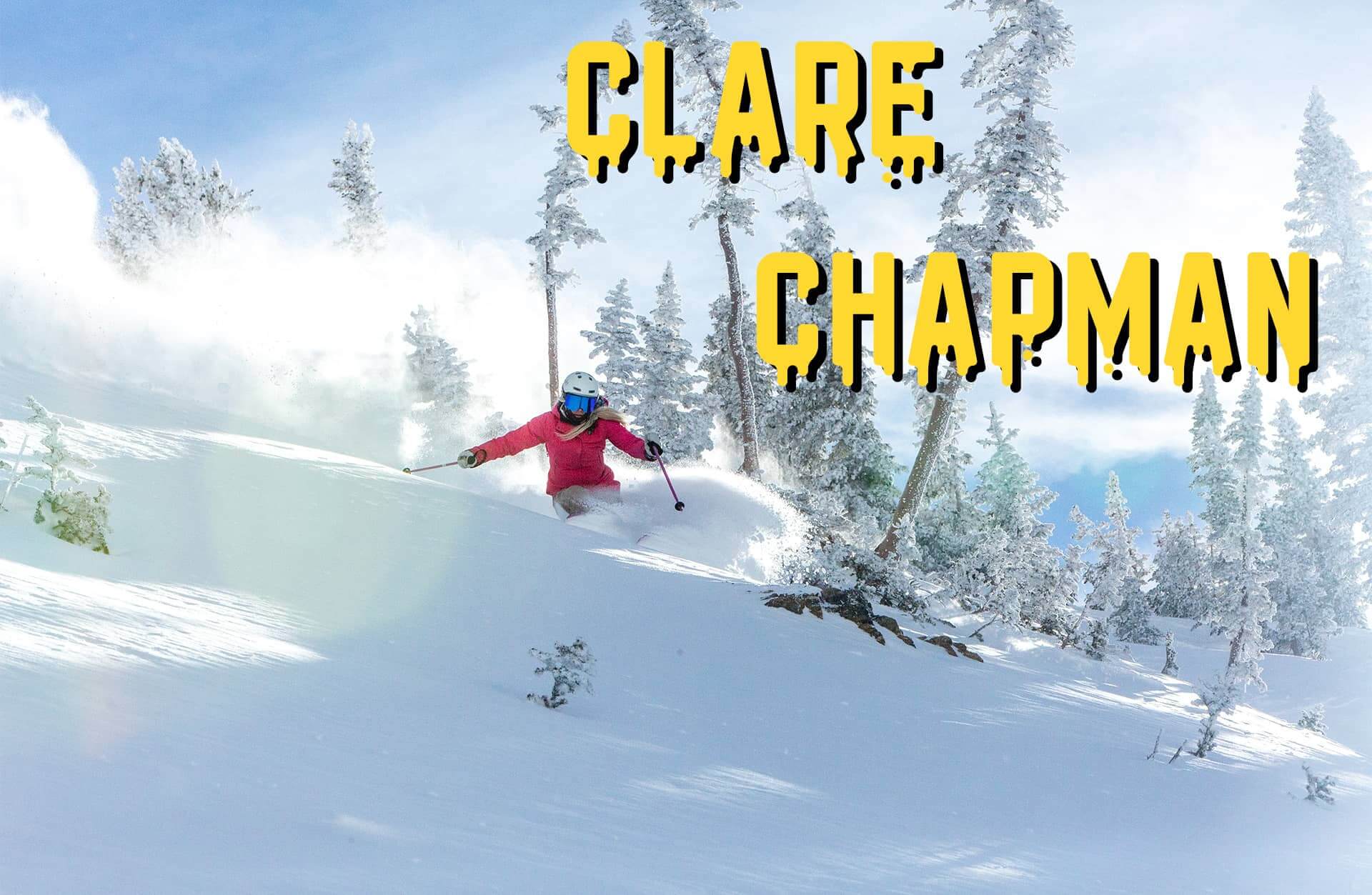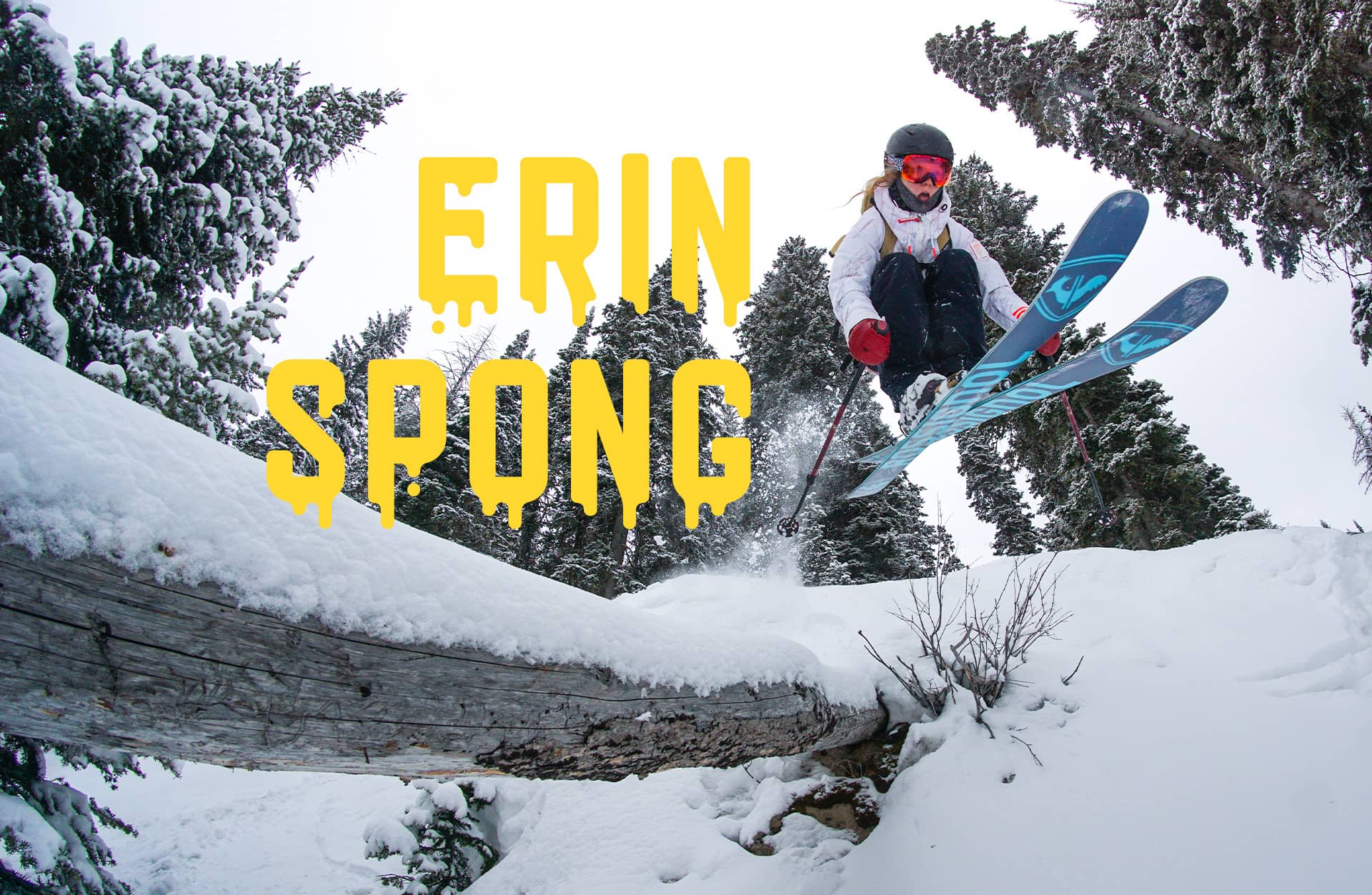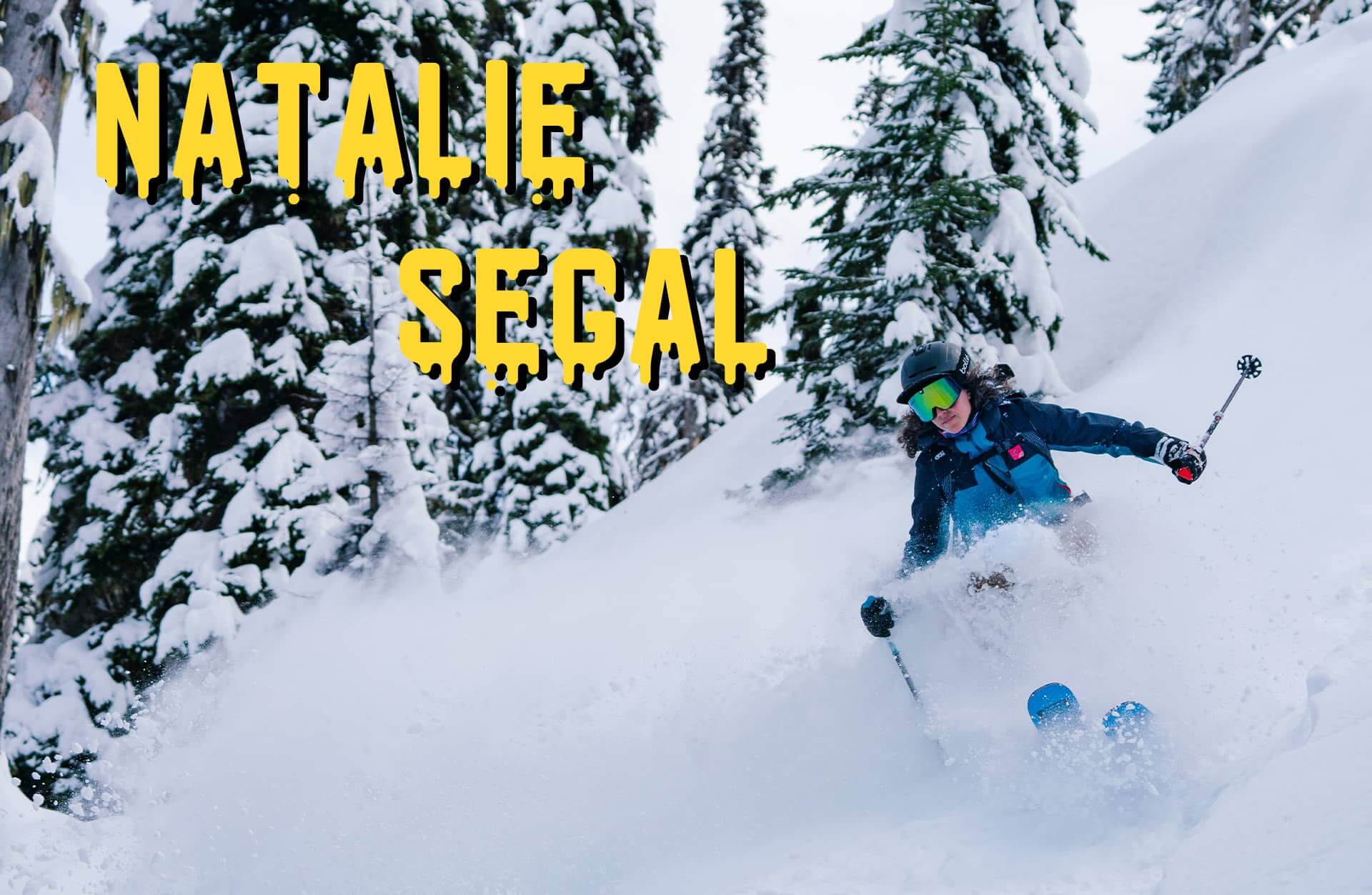SNOW // 01 JUNE 2023
CARVING A PATH TO RECOVERY
[TW: Disorder Eating]
For many, the mountain is a healing place. When standing at the mesmerizing summit, problems that once engulfed everything dissipate. However, while disengaging from stress can be healthy in moderation, there is a point at which taking time for yourself just becomes running away. It is not an easy balance to strike, as skier Clare Chapman has discovered through her mental health journey. Luckily she isn’t alone in her efforts. Standing with her each step of the way as she recovers from an eating disorder are her friends, ready to support Chapman both on and off the mountain.
Skiing didn’t cross Chapman’s radar until her late teens when her family moved to Utah. Her introduction to the sport was less love at first sight and more instantaneous loathing. “I was not happy about [the move],” explained Chapman. “And Christmas that year, my dad made everybody go skiing. I took a lesson on the rope toe, and I thought, this is terrible! I’m never going to do this again.”
It was a damning verdict that for many would signal the end of their mountain sports career, and that may have been the case for Chapman if it wasn’t for her very persistent father. “The next Christmas he made us all go skiing again and I just absolutely fell in love with it,” grinned Chapman. “I skied 10 half days with my dad at Alta, and that summer I decided I was going to work up there.”
With a 10 day season under her belt, Chapman applied to be a ski school instructor. “Because I was such a great skier, I had to share all of my knowledge,” laughed Chapman, reflecting on her naivete. Still, Chapman got the job, and what she may have lacked in experience she made up for in stoke, learning the ins and outs of skiing alongside the kids. “I was an instructor apprentice. I would go behind the kids and pick them up as they fell, but really, I also did all the drills. They’d be like, okay, lift your leg, and I would lift my leg. That’s how I learned to ski.”
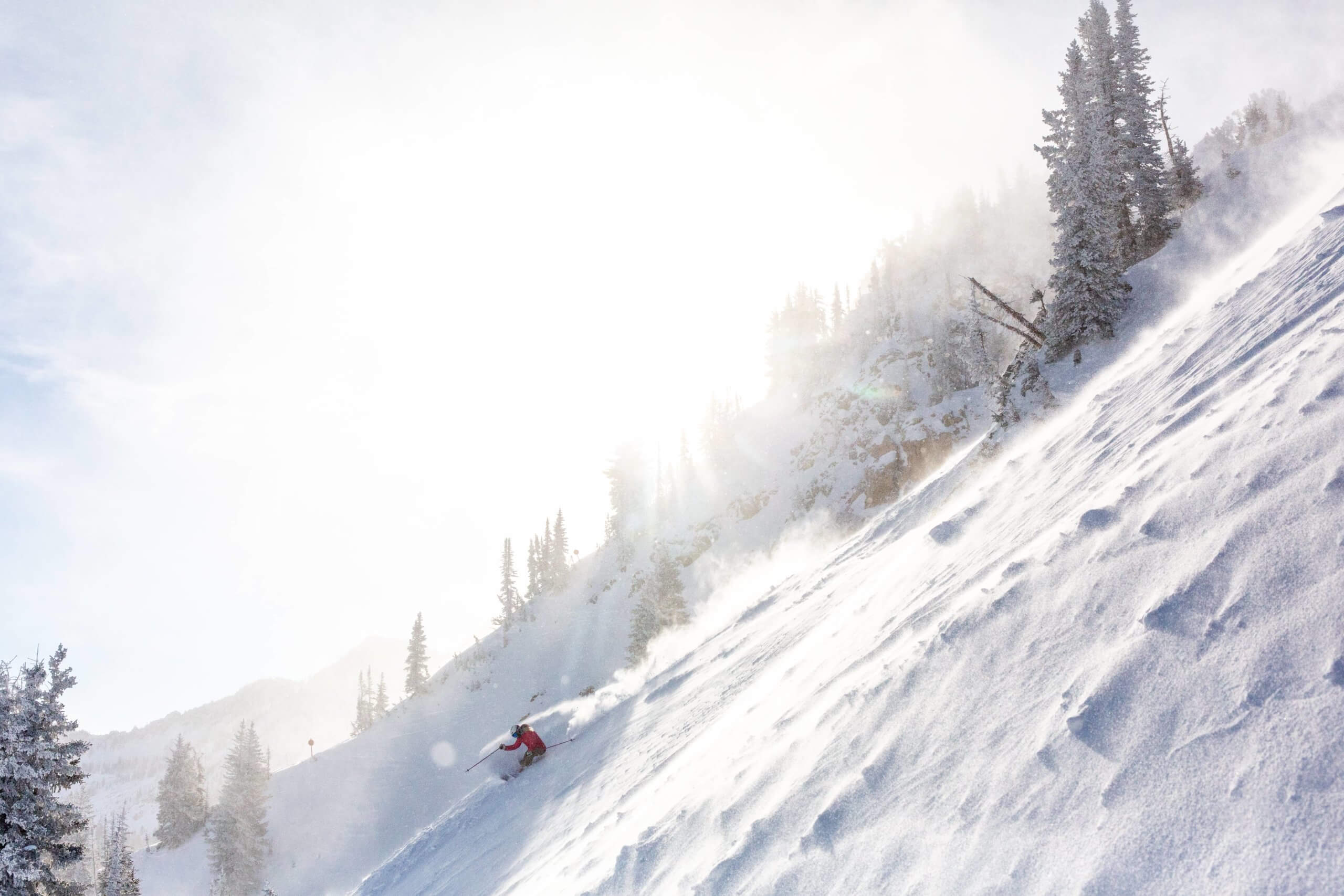
Now Chapman skis under several sponsors, including Pit Viper and Phunkshun Wear. While pursuing a pro-ski career is not a requirement to prove one’s passion for skiing, Chapman knew deep down from her first committed season up on the mountain that it was something she wanted to at least try. “You can’t verbalize it because then if you don’t make it, it just sounds stupid,” she said, explaining her initial hesitancy of committing to a pro career. “[But] I would lay in my dorm room and just watch ski movies all the time. I was watching Angel Collinson, Elyse Saugstad, and Tatum Monod. And I was just like, that is fucking crazy! They’re just jumping off those cliffs in Alaska. That’s wild! I wish I could do that. I wish I didn’t start so late so I could do that. I think there was that kernel [of wanting to pursue skiing more seriously] back then.”
As she’s gained sponsors and moved forward in her career, that little voice of doubt still pipes up from time to time in the back of Chapman’s mind. “A part of me didn’t feel like I was good enough. And that’s the part of me that is always saying that I’ll never be [good enough]. But I have a cool story. You don’t have to ski your whole life or race to love skiing, be good at it, and do it as a career. I’ve tried to let that part of myself lead and just be excited, knowing that I’m coming from a different place, but my passion is just the same.”
However, Chapman’s journey to where she is today was not all blue bird powder days. She was almost entirely thrown off course when the world as she knew it was pulled out from under her. “When I was 22, I felt like everything was going right,” explained Chapman. “In reality, that is not true at all. There were so many bad things going on. But, in my head I was like, yeah, this is great. I’d been with my boyfriend at the time for three and a half years. We had two dogs. I’m skiing well. I think I’m going to get some sponsorships. My parents, their contract with the University of Utah was up, and that summer they decided that they were going to move to Australia. Which I thought was really exciting, I was going to get to visit Australia! And then right after my mom left, my boyfriend and I broke up.”
“We had just signed a lease and I put down all this money as a deposit. My parents had left a dog with me, so I had three dogs. I didn’t have anywhere to live. All of my friends were mutual friends with the ex-boyfriend. My parents were gone. My whole foundation just disappeared. It was the beginning of everything good, but it felt like the complete opposite at the time.”
Thrown into the grieving process with a non-existent support system, Chapman grasped for control wherever she could find it, and where she found it was in food. More specifically her relationship to it. “I started to put a lot of focus on my appearance because I felt like everything else was out of my control, but that was the one thing that I felt I could control,” explained Chapman. “There was also this strange relationship between the sadness I was feeling, the grief for losing that relationship, and eating. When something really big happens, for me [at the time], it was very natural to not feel hungry and to not want to eat. There was this part of my brain that was saying, if you eat, then you’re not grieving. You didn’t care. So I put all of that care into doing the opposite, not taking care of myself at all.”
Running off manic energy, Chapman drank, smoked, and ate very little as she navigated the aftermath of a toxic relationship. Still, unbeknownst to Chapman, buried beneath it all was a part of her that was ready to grow and show the world everything she could be. For Chapman, that path began with finding community in the place she could still feel like herself, skiing.
“While I was in that relationship, I didn’t make my own friends. I was very threatened by women. If I was going skiing with anybody, it was usually just boys. Outside of skiing, I just couldn’t really be friends with girls. That was partially the abusive relationship and partially just something I had to work on on my own,” explained Chapman. “That year when I was single, I decided that I was going to become friends with women. That was my main goal for that winter season. It was so helpful for me to realize that I could have support and it wasn’t just competition. I found this whole new love for skiing, doing it with women. I wasn’t berating myself if I wasn’t doing well, instead I asked, are we having fun?”
Initially skiing also served as an escape for Chapman, a place where she didn’t have to think about what she was or wasn’t putting in her body. Out of sight and out of mind, skiing became a way to avoid the problems she wasn’t ready to confront. However, as she continued to progress it became more and more difficult to turn a blind eye. “I wanted to be hitting cliffs and doing tricks,” said Chapman. “If you aren’t giving your body enough nutrition, your bones aren’t going to stay strong. I didn’t want to follow this passion for skiing while knowing that I was destroying my body and it wasn’t going to hold up.”
It took Chapman a while to seek help for her eating disorder, simply because at the time it didn’t feel like an issue. It is difficult to understand the full force of a hurricane when resting in the eye of it. As Chapman explained, “I was seeing my therapist, but the poor side of therapy is if you’re not ready to recognize something in yourself yet, it’s still not going to be fixed in the therapy. She was very helpful for me, finding coping tools with the depression I was feeling and the loneliness, resetting my whole life. But I wasn’t very honest about my eating habits because I didn’t think it was a problem.”
Thankfully, life has a way of rattling the cage at just the right time. Chapman recalled, “One of my friends posted on Instagram that she had started eating disorder recovery and she was going to this program. Then, the same day that I saw that post, I had lunch with a family friend and she totally called me out. She was like, you’re way too skinny. Are you even eating? Do you need help? Here are places where you could get help.”
Chapman’s reflexive response was of course denial, waving the inquiry away with “I really don’t think it’s that bad. I have it under control, I’m fine. It could be so much worse. I eat plenty.”
But, as she processed the conversation on her car ride home, the truth began to reveal itself. “I left that lunch and I just started bawling on my way home. It still makes me want to cry just thinking of that realization slowly settling in. Because you want to love yourself and take care of yourself, and all of a sudden you realize that you’re doing the opposite. You’re slowly killing yourself,” explained Chapman. “I reached out to that friend and we went on a walk. She would ask me kind of what habits I thought were bad and what I was struggling with, and it was still all half truths. Then within a week, there started to be this very physical anxiety around food. I couldn’t sit down to dinner and just eat dinner. That was way too hard. I’d start to cry and I’d have to call my mom. I couldn’t get through a meal. When did that happen? It took a full year for me to recognize that something was wrong, and then it took a lot longer to really work on it.”
Reflecting back on this turning point, Chapman said, “[At the time] there was this shift that was happening inside of me, and I had to be ready enough for [my friend] to say that to me. I’m really glad that it all lined up.”
As is the case with any healing journey, Chapman’s recovery was not an instantaneous moment, but rather the result of continuous support by the women she’d surrounded herself with in the previous ski season. So when COVID hit and shut down the ski resorts, Chapman needed to find a new way to stay connected with that community, thus Humans of Salt Lake was born. “I kept seeing these things that I wanted to share to my Instagram story of all these women doing rad things. And I was like, I’m just spamming everybody. I feel like there needs to be something separate for this,” laughed Chapman. “Then COVID hit, the ski season ended and I went from having this super present, supportive community of women to just being by myself in my house. It was a stark contrast. I thought, well, there’s one way that we can all stay connected. And right now that’s virtually, so I’m going to create this account. I really wanted to make a short movie featuring all of these women because I thought it was just so cool what everybody was doing.”
The group’s mission of connection-over-competition serves as the driving force behind all of Chapman’s projects. To spread the message that anyone of any gender and skill level can ski, and as long as you’re having fun by yourself or with your friends, you’re doing it right.
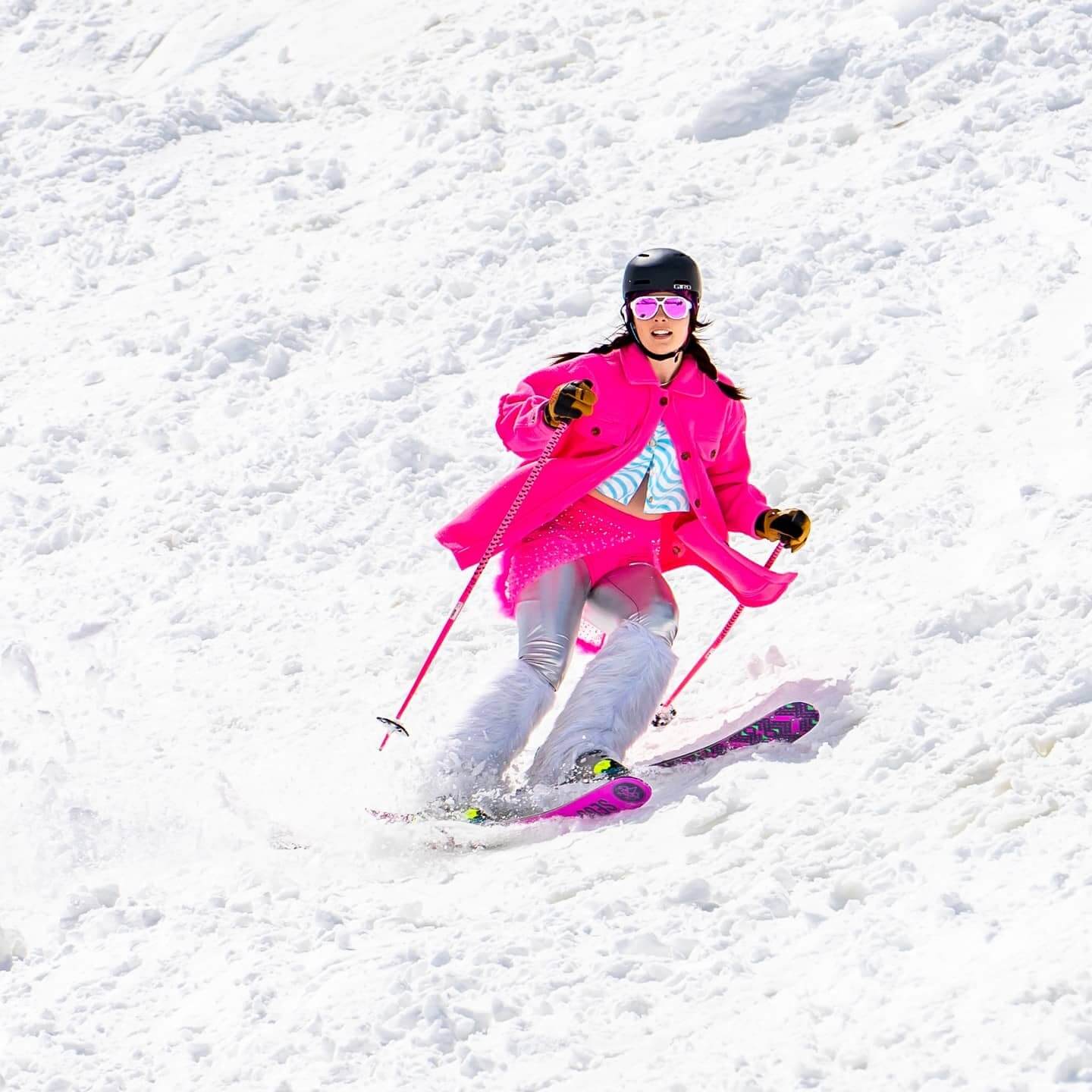
Nowhere can this sentiment be seen more clearly than in Chapman’s debut film HVE FVN. Made in collaboration with skiers Rian Zetzer and Alliy Hansen, the film emphasizes that the joy of skiing is not found in landing the biggest tricks, or sending the tallest cliffs, but rather in the time spent playing in the snow with your friends. “Basically, on a hike with my two friends, Rian and Alliy, someone at some point said, ‘I really want to make a ski movie.’ I think it was Alliy. I think she came into the hike with this plan. Me and Rian were like, ‘that would be so cool!’ And then by the end of the hike, we had a plan. We were going to make a pitch deck, we were going to reach out to sponsors, and we were going to make a movie. It was an innocent start, I would say,” laughed Chapman.
Though an innocuous beginning, the full scale of what the group had committed to soon caught up to them in Canada. “The reason we named it HVE FVN is we were in British Columbia for a month and it wasn’t snowing at all. It was really bad skiing conditions, and none of us were having fun. At some point we were all just like, fuck this. What are we doing if we’re not going to have fun?” explained Chapman. “So, we named the movie that. And that’s how I wanted to edit my piece. I wanted it to just be fun. It’s not all this perfect pow, and I probably don’t even land half the things that I put into my edit. I just wanted it to look fun! Because that’s what skiing should be about.”
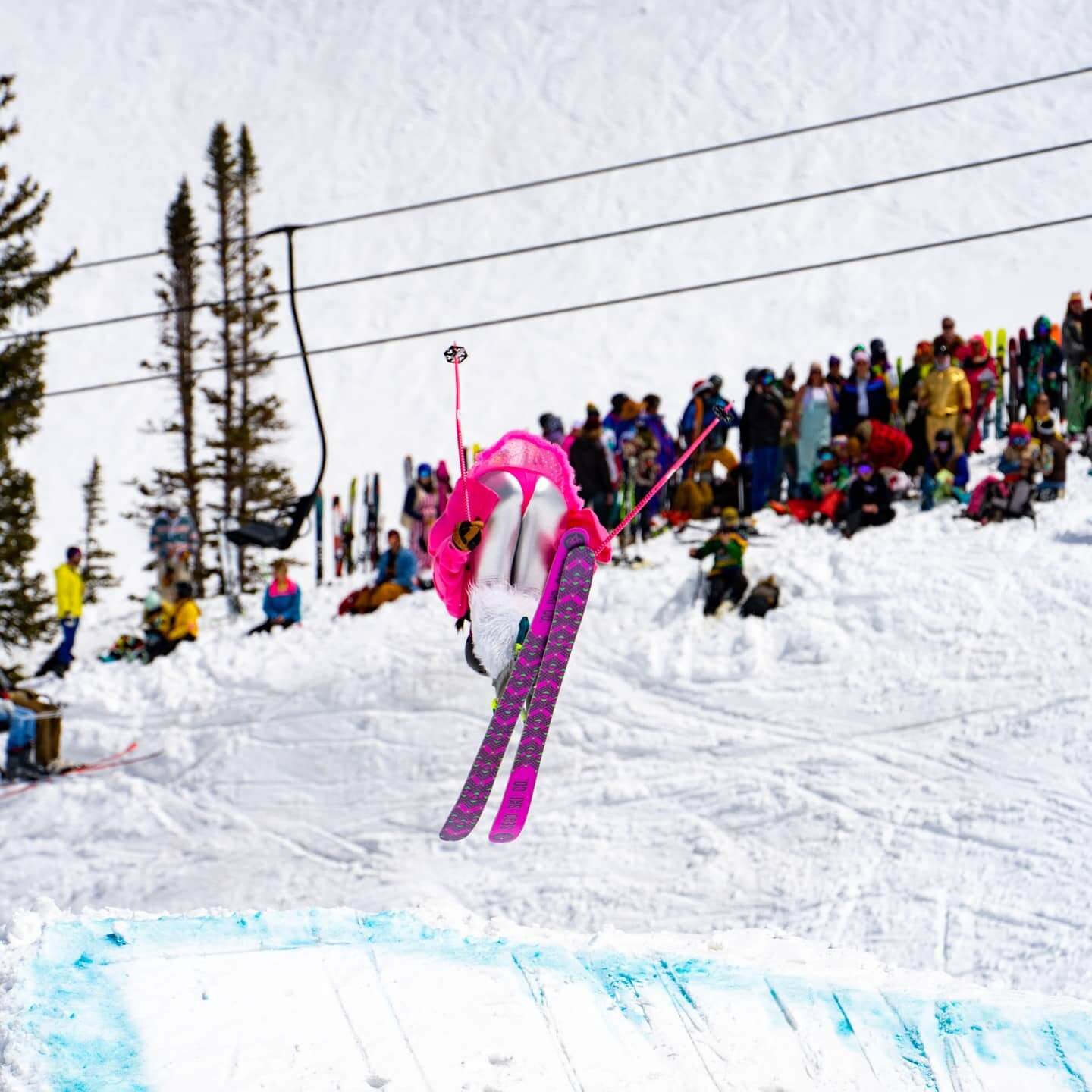
“It was definitely a humbling experience,” she continued. “All the skiers I’ve talked to that have made films, they’re like, that’s what your first film is supposed to feel like. You have these high expectations, you think it’s going to be the best, and then it’s just kind of a shit show, and you roll with it and you’ll learn from it.”
Along with producing her own film, Chapman participated in the 2022 project, Mountain in my Mind. Created by John Padilla, the film takes a hard look at mental health within the ski industry through the stories of the featured athletes. Reflecting on her experience in the film, Chapman said, “It was an awesome filming experience. John was great. The filmmakers and photographers were great. The interview was very comfortable, and I’m so excited about the project and that it got out there and it got the kind of support that it did. [But when] I went to the premiere in Salt Lake, watched the film with everybody, it was so hard for me to watch.”
She continued, “I spent several days falling back into bad eating habits. I was really stressed about it and I was putting this focus on my body. I really realized how hard it is to put yourself out there and then have [your story] given to all these people that you don’t know. It’s a very vulnerable space. And no matter how positive the support you’re getting is, it’s so important to maintain the work. I felt like everything I said in Mountain in my Mind is true to how I felt. [The movie] also felt like this new thing that was out of my control, that I did this skiing day, I did this interview, and then they put it out there with their editing.”
Mental health requires maintenance. It is not something that can be addressed once and then left to its own devices. So for athlete’s that wish to share their experiences with others, to open the door to new conversations around mental health, they need to find a middle ground. As Chapman explained, “There’s a lot of ups and downs. And if you feel like you can talk about what you’re going through at any stage of what you’re going through, that’s so helpful and important, but it’s also important that you take care of yourself and you don’t ever have to talk about it. Just keep taking care of yourself because it’s a lifelong process.”
Thankfully, over the past few years, more and more athletes have found themselves in a healthy and stable place where they are able to share their stories. As these conversations become more and more normalized, Chapman hopes to see a change in the archetypal mindsets of traditionally oriented ski areas such as Alta. “I feel like at Alta, not having a balanced life is prized and encouraged. It’s very much ski hard, drink a lot, don’t sleep too much, be up early, and don’t miss days. [Of course] there’s individuals that don’t feel that way. But for me, I feel like that’s the lifestyle that’s encouraged,” explained Chapman.
“So many people struggle with taking care of themselves. That Peter Pan Syndrome where you can see from the outside that all these men are struggling with depression and other mental issues, but they won’t see it in themselves and they won’t get help. They think that skiing is the cure. That’s really hard to be around and really hard to watch, especially when you care a lot about these men. I think it’s so helpful to have men that will speak out about their own mental health issues and how they are healing from it, and also having women that will encourage that [process of seeking help] for the men. Saying, you deserve this, and there’s more that you can have in life. I think [those conversations are] moving [ski culture] in the right way.”
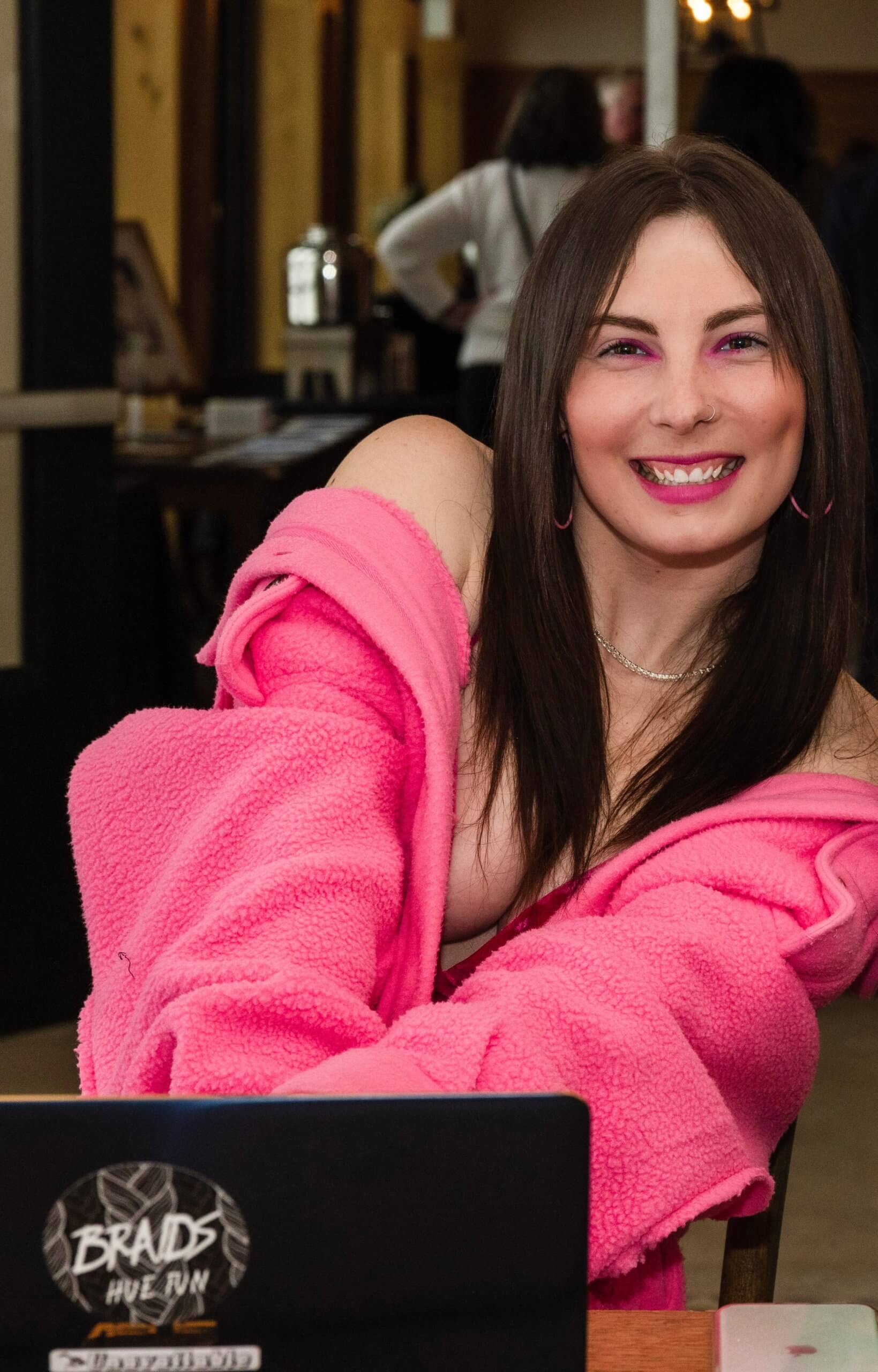
For Chapman, these conversations around sports and mental health have forced her to take a step back and reevaluate her relationship with skiing. “This year, I’ve had a really big disconnect with skiing because I just feel this constant pressure to get better and to be the best,” explained Chapman. “It’s unrealistic for me to even think that way, but also it has taken so much joy out of skiing. I feel like if I’m not going out there and scaring myself every day, then why am I even going out there? If I’m not getting new tricks, am I even worthy of being in this role as a professional skier? That’s just something I have to keep working on, is really validating myself and having fun with things instead of taking myself so seriously all the time.”
Still, this distance has allowed Chapman to reflect on her priorities, and recognize what there is outside of skiing that brings her happiness. “I do have these big ideas of what I’m looking for in life. I want to slow down more and one of my favorite things to do is walk my dogs. So I want to walk my dogs more. Then, I have more concrete goals. I want to be able to buy a house and I want to have kids. I’m going to take steps, including attending nursing school, that will help me to get there,” said Chapman. “I think there’s a lot of tunnel vision, especially at Alta, where skiing has to be number one, and every day has to be your best day. I’ve been there eight years, and I think separating myself made me realize that I’m ready to do something different. That skiing doesn’t have to be my whole life or my whole identity.”
Life is a constant pursuit of finding your fulcrum where you can balance comfortably. From time to time that means things need to shift around. Though Chapman faces uncertainty as she decides how she wants skiing to fit into her life, there is still undeniable joy found in the days where she can let everything else go and just have fun. “Today it was sunny, and I decided to shoot with one of the Alta photographers. I put on glitter and lipstick, got out there and I didn’t do anything crazy, but I had so much fun. It was me, one other woman, and the photographer who’s also a woman. We were stoked on the turns and each other’s skiing. Everybody was happy and cheering each other on,” she grinned. “It was high vibes the whole day.”
